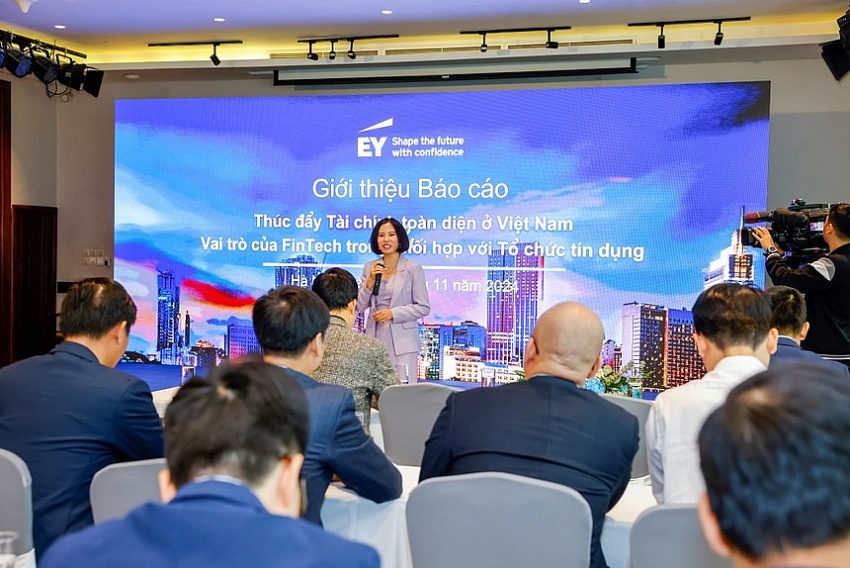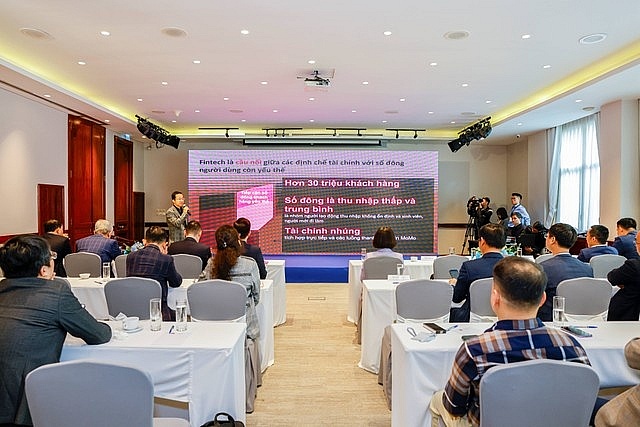Fintech a solution to financial inclusion
At the report launch event themed “Promoting financial inclusion in Vietnam and the role of fintech in collaboration with credit institutions”, hosted by Ernst & Young Vietnam (EY Vietnam) on November 28, Vietnam’s progress in financial inclusion was highlighted. The country ranks third in ASEAN, behind Singapore and Thailand, and 14th globally in the Principal Financial Group’s 2024 Global Financial Inclusion Index.
Nguyen Thuy Duong, chairwoman of the board at EY Vietnam, presented detailed data, noting that over 87 per cent of adults in Vietnam now have payment accounts, up from 31 per cent in 2015-2017. Between 2021 and 2023, mobile payment transactions grew by an average of 103.3 per cent annually, while internet payment transactions increased by 52 per cent annually. Payments via QR codes experienced growth exceeding 170 per cent in both volume and value.
 |
| Nguyen Thuy Duong, chairwoman of the board at EY Vietnam sharing insights at the event. Photo: EY Vietnam |
“These figures are remarkable, considering global advancements in financial inclusion over the past decade. Efforts by policymakers have reduced the number of unbanked adults from 2.5 billion in 2011 to 1.4 billion in 2021,” Duong said, referencing the World Bank’s September 2022 Financial Inclusion report.
However, Duong also pointed out ongoing challenges, stating, “These challenges stem from gaps in financial infrastructure, limited access to formal credit channels, difficulties in credit scoring for micro-enterprises and household businesses, insufficient financial literacy among certain users, and gender inequality in financial access.”
Nguyen Xuan Hoang, vice chairman of the board at IT company MISA said,“Customers without bank accounts or those with limited usage of banking products often fail to meet approval criteria. This makes it difficult for them to access products and services offered by traditional financial institutions.”
Do Quang Thuan, vice president at MoMo, underlined the role of fintech as a bridge between financial institutions and underserved users. “MoMo focuses on leveraging technology to develop financial and banking products tailored to users’ diverse needs. This approach drives financial inclusion by enabling easier and safer access to financial services,” he said. “Products must align with customer needs to seamlessly integrate into payment ecosystems.”
 |
| Do Quang Thuan, vice president at MoMo speech at the event. Photo: EY Vietnam |
Based on its findings, EY Vietnam proposed several recommendations. For regulators, the report emphasised the importance of advancing the legal framework to support digital transformation in banking and enhancing technological infrastructure. It also suggested fintech companies expand their focus beyond payment services to include other areas of fintech.
For credit institutions, EY Vietnam recommended fostering collaboration, promoting financial literacy and education, and developing open banking mechanisms. Fintech firms were urged to simplify financial services and cater to the digitalisation needs of micro, small, and medium enterprises.
“Participating in controlled testing mechanisms allows fintech firms to trial and refine emerging technologies. This approach not only addresses evolving user and business needs but also ensures user safety and advances financial inclusion,” Duong said.
“The collaboration between banks and fintech companies is especially critical for applying financial technologies within the current regulatory framework, ensuring that financial innovation benefits all citizens.”
 |
| Overview of the panel discussion. Photo: EY Vietnam |
| To prepare the report, EY conducted an extensive survey involving nearly 1,500 users and over 1,000 micro, small, and medium enterprises, as well as household businesses in Vietnam. Additionally, EY carried out in-depth research on industry reports, academic studies, and policy documents to provide a comprehensive perspective on the financial inclusion landscape. Financial inclusion, as defined by the World Bank, refers to: "The ability of individuals and businesses to access useful and affordable financial products and services, such as transactions, payments, savings, credit, and insurance that meet their needs and are delivered in a responsible and sustainable manner." |
 | 2024 sees $1.41 billion in fintech funding so far ASEAN fintech funding totalled $1.41 billion in the first three quarters of this year, constituting four per cent of global fintech funding. |
 | Malaysia's Solarvest and Finhero launch first solar financing fintech solution in Vietnam Solarvest Holdings Berhad, a Malaysian clean energy solutions provider, has launched its Powervest solar financing programme in Vietnam to support the clean energy transition. |
 | Visa unveils new products at Singapore Fintech Festival 2024 Global payments giant Visa announced a suite of new products and services that will be available in Asia-Pacific at a gathering on November 6 at the Singapore Fintech Festival (SFF) 2024, which is running from November 6-8. |
What the stars mean:
★ Poor ★ ★ Promising ★★★ Good ★★★★ Very good ★★★★★ Exceptional
Related Contents
Latest News
More News
- VIB named Best Customer Satisfaction Bank in Vietnam 2025 (December 26, 2025 | 16:40)
- Visa and Techcombank win AmCham’s 2025 ESG Tech Innovation Award for Eco Card (December 09, 2025 | 12:16)
- Visa brings tap-to-ride payments to Hanoi Metro Line 2A (December 05, 2025 | 17:35)
- Cross-border QR payments launched for Chinese tourists (December 03, 2025 | 19:12)
- VIB honoured by JP Morgan with 2025 US Dollar Clearing Elite Quality Recognition Award (December 02, 2025 | 17:04)
- Home Credit Vietnam brings financial literacy closer to women and students (November 20, 2025 | 11:25)
- MB partners with Visa, KOTRA to launch new MB Visa Hi BIZ card (November 20, 2025 | 11:24)
- VPBank upgrades core banking with Temenos and Systems Limited (November 14, 2025 | 17:54)
- CPO Home Credit shares how to build an AI-driven but human-centric workplace (October 30, 2025 | 09:56)
- VIB hits $267.4 million in pre-tax profit over first nine months (October 29, 2025 | 12:12)

 Tag:
Tag:



















 Mobile Version
Mobile Version